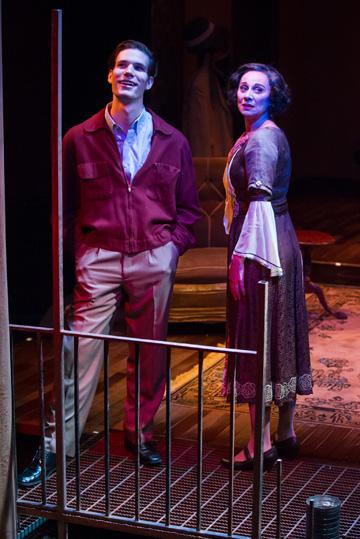

Tennessee Williams’s enduring family drama, The Glass Menagerie, is an older play with new life breathed into it by a sparkling cast for Milwaukee’s In Tandem Theater. Set in St. Louis in the 1930s, Glass Menagerieis, as a narrator tells us, a “memory play.” As such, he tells us, it is not fully illuminated but exists in a twilight world. He cautions that the action may not be naturalistic.
With those opening words, the show’s narrator (who also plays central character Tom Wingfield) opens a heart-wrenching examination of a dysfunctional family in the years prior to World War II. The opening speech itself is deceptively off-the-cuff, although a smart actor knows that each word is important to setting up the scenes that follow.
Actor John Mundschau Glowacki, who is about the same age as this character, makes an impressive professional stage debut as both the restless Tom and the laid-back narrator. Tall and square-jawed, with the good looks of a male model, he is perhaps more handsome and in command of himself than Tom needs to be. But he brings a surprising discovery to this production that shall be revealed later.
All the characters in The Glass Menagerie deal with their own fears. In Tom’s case, it is the prospect of wasting his life in a shoe warehouse. He does this to care for his mother and sister. They became his responsibility after his father, the telephone worker who famously “fell in love with long distance,” abandoned the family years ago.
In the opening scene, in which the family is eating dinner, one can surmise that Tom’s mother, Amanda, probably had a lot to do with her husband’s departure. As they eat, she nags her children incessantly. Tom is so frustrated at her nitpicking that he leaves the dinner table.
Tom’s sister, Rose, is more easily cowed into submission. She is shy and sensitive, and very self-conscious of her lame leg. She responds to the home’s disharmony by retreating into her own world of old phonograph records and a small collection of fragile glass animals. It is the quick-witted Amanda who has named them, “the glass menagerie.”
Accomplished actress Angela Iannone brings just the right balance to Amanda. She demands respect, attention and obedience as the family’s matriarch, but she does it without overshadowing the other characters. She also demonstrates the abundant love she has for her children. As the nagging mother who wants only happiness for her adult children, she is the ultimate contradiction.
Under Mary MacDonald’s accomplished direction, the audience sees how much Tom and Amanda are alike. True, they bicker loudly and often. But Kerr brings out their similar sense of humor and sarcasm, as well. One can see in Amanda’s sad eyes that she realizes that one day, Tom, too, will be gone. Tom, too, is almost overwhelmed by guilt at the prospect of leaving his mother and disabled sister.
Almost unconsciously, Amanda hastens Tom’s exit by pestering him about where he goes after dinner. She refuses to believe his explanation that he goes to the movies. She wants him to stay where she can see him and be comforted by his presence. Among the most memorable parts of The Glass Menagerie are Amanda’s illusions about how her life “should” have turned out. A Southern belle, she fancied herself as a plantation owner’s wife, in a big house full of servants. She is completely out of her element in the grimy city of St. Louis, and she is bitter about how things turned out for her. The moody, filtered lighting echoes the family’s feelings about their modest “home.”
So she turns her attentions to her children and their lives. After successfully prodding Tom to invite a “gentleman caller” to dinner, she earns extra money in order to class up the somewhat shabby apartment and make a lovely blue dress for Laura. (Kudos to the costume designer for making Laura’s dress truly lovely and not some over-the-top monstrosity. Likewise, Amanda’s party dress is also lovely. It must be more elaborate than Laura’s outfit but is a far cry from the “Gone with the Wind” ball gowns Amanda often wears). Tom, meanwhile, keeps reminding Amanda “not to make a fuss” over the gentleman caller. This is like telling a Dalmatian to stay off the fire truck once the bell has rung.
The most mesmerizing scenes of Glass Menagerie typically come in the second act as the Gentleman Caller finally makes an appearance. Rick Pendzich, who nails this part, shows us a blowhard who thinks a great deal of himself. He enjoys Laura’s quiet demeanor so he can keep the limelight on himself, talking of his glory days in high school and downplaying the menial job he currently holds. Laura’s eyes fill with wonder that he is even talking to her at all, and she surprises herself at how much she enjoys the attention. When she hands him a broken glass figurine to keep “as a souvenir,” one senses that she may be ready for something more in life.
Grace DeWolff, who likewise is about Laura’s age, has the retro looks and acting ability to make a credible Laura. We see her blossom under the gentleman caller’s compliments, forgetting her acute shyness for a moment. We almost see her grow lovelier in the apartment’s candlelight, as she opens up little by little to her friend. Pendzich, on his part, makes the suitor enough of a jerk so that audiences are almost glad that this is one fish who got away.
Although playwright Tennessee Williams went on to win two Pulitzer Prizes and many more successes in his professional life (such as A Streetcar Named Desire), he had to live with the fact that his early, semi-autobiographical play, The Glass Menagerie, would always be linked to him. In this terrific production, it is as fresh, funny and heart-wrenching as one would imagine it was in 1944. It is a definite “must-see” in this fall theater season.
